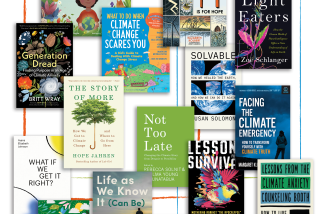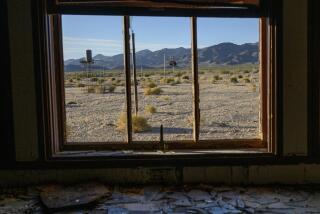Report on climate change depicts a planet in peril
- Share via
Climate change will disrupt not only the natural world but also society, posing risks to the world’s economy and the food and water supply and contributing to violent conflict, an international panel of scientists says.
The warnings came in a report drafted by the United Nations-backed Intergovernmental Panel on Climate Change. The 29-page summary, leaked and posted on a blog critical of the panel, has been distributed to governments around the world for review. It could change before it is released in March.
“We see a wide range of impacts that have already occurred ... on people, ecosystems and economies,” said Chris Field, a scientist at the Carnegie Institution for Science and co-chairman of the group writing the report. “Looking into the future, we see increasing risks that are more pervasive and more severe with greater amounts of climate change.”
Field and an IPCC spokesman confirmed the authenticity of the draft. “This is a close-to-final work in progress,” Field said.
The report describes a planet in peril as a result of the human-caused buildup of greenhouse gases since the Industrial Revolution, where glaciers are shrinking and plants and animals have shifted their ranges in response to rising temperatures. As global warming continues through the 21st century, many species will face greater risk of extinction, marine life will shift toward the poles and seawater will grow more acidic, the report says.
By 2100, hundreds of millions of people in coastal areas will be flooded or displaced by rising sea levels. The arid subtropics will have less fresh water, leading to more competition for resources.
The global food supply is also at risk, with yields of wheat, rice, corn and other major crops projected to drop by as much as 2% each decade for the rest of the century, even as demand rises.
Among the other risks forecast in the report: extreme heat waves that will be especially deadly in urban areas, where a growing population will also contend with severe storms, flooding and drought. Rural areas will cope with less drinking and irrigation water and less productive farming.
Global surface temperature has risen about 1.5 degrees since 1880 as greenhouse gases have accumulated in the atmosphere from burning fossil fuels, industrial activity, agriculture and deforestation. Cutting emissions could ease the rate of change, but not until the second half of the century, the report says.
The report “brings this issue home and it shows us why it’s important,” said Katharine Hayhoe, a climate scientist at Texas Tech University who did not contribute to the assessment. “The reason we care about climate change is because it affects us: It affects our food, our water, our health, our roads, buildings and infrastructure and our natural environment.”
Climate change alone isn’t the cause of most of the ill effects. Rather, it worsens them by interacting with other factors, such as population growth, urbanization and exploitation of natural resources.
The panel sees the changing climate slowing down economic growth and worsening poverty, hunger and disease.
The report also says climate change increases the risk of violence and civil war.
Some low-lying countries will see their territorial integrity challenged by rising sea levels The shifting of water supply, sea ice and fish stocks across international boundaries has “the potential to increase rivalry among states,” the report says.
In one section, the report breaks down the effects on specific regions. Among the greatest risks to North America, for instance, are wildfires, heat-related deaths and coastal flooding. Africa is threatened by water shortages, famine and disease as temperatures rise and rainfall patterns shift.
The IPCC, created in 1988, has issued five major assessments of the science of climate change, each including a report on its effects. Hundreds of scientists from across the world collect and summarize thousands of peer-reviewed studies to come to a consensus every five or six years.
In September, the panel predicted that the planet will warm between 2.7 degrees and 8.1 degrees if carbon dioxide levels in the atmosphere double, and that sea levels will rise 10 to 32 inches by century’s end. For the first time, the panel also endorsed a limit on the amount of carbon that can be emitted before the temperature rises more than 3.6 degrees and the worst effects of climate change set in.
The U.N.’s World Meteorological Organization announced last week that the rise in greenhouse gases in the atmosphere accelerated to a record high in 2012. Carbon dioxide, the main heat-trapping gas, was responsible for 80% of the jump, pushing concentrations to levels not seen in at least 800,000 years.
More to Read
Sign up for Essential California
The most important California stories and recommendations in your inbox every morning.
You may occasionally receive promotional content from the Los Angeles Times.











